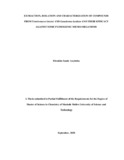EXTRACTION, ISOLATION AND CHARACTERIZATION OF COMPOUNDS FROMTermitomyces letestuiAND Ganoderma lucidum AND THEIR EFFICACY AGAINST SOME PATHOGENIC MICRO-ORGANISMS
Abstract
Studies on mushrooms and other fungi overalong timehaveshowed a number of physiological properties that provide health benefits. This is supported by the traditional belief that mushroom consumption provides remedies to various humaninfections. Bacteria and fungi have been developing resistance to the existing drugs compared to the rate at which new drugs are being discovered. The currentstudy reports onthechemical investigationof the localTermitomycesletestuiand Ganodermalucidumfrom Kakamega, Kenya fortheirantibacterial and antifungal properties.Dried samples of the two mushroom species were extracted sequentially usingn-hexane, ethylacetate and methanol.Separation of the extracts wasdone using Column Chromatography while purification was done using Thin Layer Chromatography.Chemical structuraldetermination was done using Infra-Red (IR),1D(1H,13C-NMR)and 2D NMR spectroscopy and comparison with physical and spectroscopic data of previously isolated compounds. Antimicrobial studies of the crude extracts and isolates were carried out on six microbial strains (Bacteria: Methicillin Resistant Staphylococcus aureus(MRSA),Escherichia coli, Klebsiella pneumoniae, Pseudomonas aeruginosa, Streptococcus pyogenes andCreptococcus neoformansfungi). The extracts and pure compounds fromthe mushrooms wereapplied at a concentration of 100μg/ml using well diffusion method. Zone of inhibition was analyzedstatistically using bar graph and thencompared with standard drugs ampicillin as antibacterial and nystatin as an antifungal. Standard procedures were used in the determination of phytochemicals fromthe crude extracts. Thephytochemicalqualitativedata for the mushrooms revealed the followinggroups of compounds; steroids, triterpenoids, carbohydrates, phenolics (tannins), glycosides and flavonoids. Chromatograhic separation of ethylacetateextract oflocalT. letestuiyielded an ergostane,ergosta-5,7,22-triene-3β-ol (22Z) (69). Similarly,then-hexane extract of local strain of G. lucidumyielded a 14αhydroxyl derivative of 69, ergosta-5,7,22-triene-3β,14α–diol (22Z) (72).Thecrude extracts(hexane, ethylacetate andmethanol) and the compound, ergosta-5,7,22-triene-3β,14α–diol (22Z) (72)from Ganoderma lucidumshowed significant activity against Methicillin Resistant Staphylococcus aureus(MRSA) (p > 0.022)and Streptococcuspyogenes(p< 0.05). The most sensitive microbe was Streptococcus pyogenes(40.3±0.3mm). These mushrooms can be a natural source of new drugs and nutrients for management of common infections which are threatening mankind. Their production and propagation should be encouraged.

